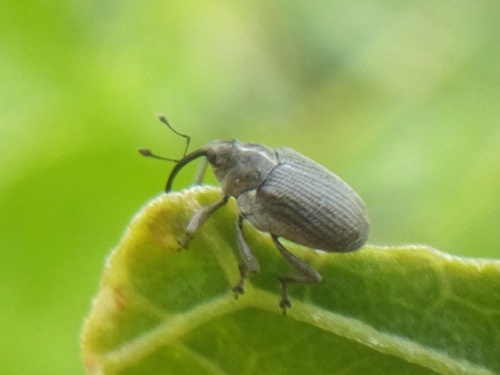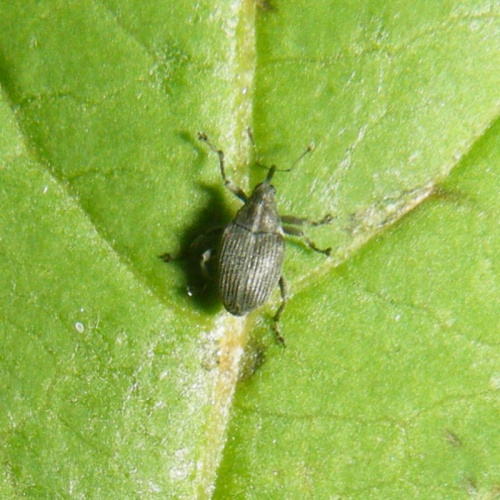Cabbage Seed Weevil - Ceutorhynchus obstrictus
Adults have round grey bodies (2 to 4 mm in length) and grey legs covered with fine white scales. Ceutorhynchus obstrictus has a long curved proboscis with small bent antennae. When disturbed, it displays the interesting behaviour of folding its legs and proboscis against its body to make it look like a small grey pebble.
Unless identified by a recognised expert, photographic evidence is required and the specimen should be examined with a microscope. In the comments box, state the key or ID method used. Note the beetle's size and describe the identifying characters. It is advisable to retain the specimen in case further checks are needed.
Around brassica plants.
Spring and summer.
The eggs are deposited into immature crucifer (Brassica sp.) pods. Larvae feed on developing seeds. The mature larvae bore out the side of the pod and burrow into the soil. Adults emerge 10-14 days after pupation begins and feed for the remainder of the season on pods and flowers storing fats for overwintering.
Fairly frequent and widespread in England and Wales.
Fairly common in Leicestershire and Rutland.
Leicestershire & Rutland Map
Enter a town or village to see local records
MAP KEY:
Yellow squares = NBN records (all known data)
Coloured circles = NatureSpot records: 2025+ | 2020-2024 | pre-2020
UK Map
Species profile
- Common names
- Cabbage Seed Weevil
- Species group:
- Beetles
- Kingdom:
- Animalia
- Order:
- Coleoptera
- Family:
- Curculionidae
- Records on NatureSpot:
- 8
- First record:
- 01/05/1992 (Jon Daws)
- Last record:
- 21/07/2023 (Smith, Peter)
Total records by month
% of records within its species group
10km squares with records
The latest images and records displayed below include those awaiting verification checks so we cannot guarantee that every identification is correct. Once accepted, the record displays a green tick.
In the Latest Records section, click on the header to sort A-Z, and again to sort Z-A. Use the header boxes to filter the list.



